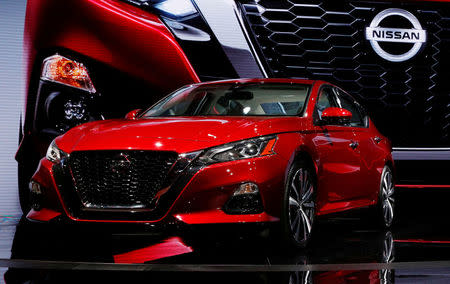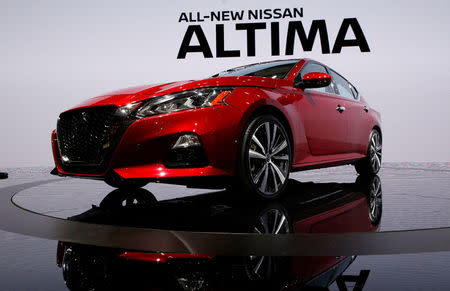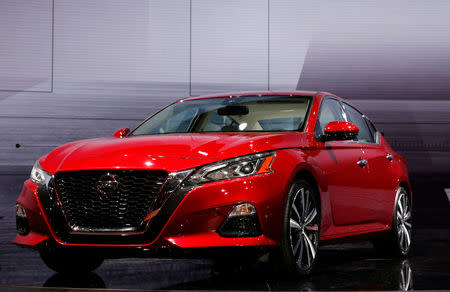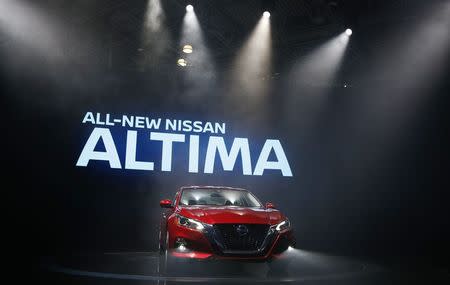Nissan launches new Altima into a sputtering U.S. sedan market
By Nick Carey
NEW YORK (Reuters) - Japanese automaker Nissan Motor Co Ltd <7201.T> on Wednesday unveiled an all-new Altima sedan, and demonstrated the auto industry's problem adjusting new-model investments fast enough to keep pace with shifts in consumer demand.
The Altima, and rival midpriced sedans such as Toyota Motor Corp's <7203.T> Camry and Honda Motor Co Ltd's <7267.T> Accord, used to be high-volume sellers, keeping assembly lines rolling full-time. All three automakers several years ago committed to significant redesigns of their sedans.
Since those investments were made, demand for midsized cars has collapsed in the United States due to the growing consumer appetite for larger SUVs and pickup trucks. Sales of sedans made up 36.8 percent of the U.S. market in 2017, down sharply from 51.2 percent in 2012.
Through February this year, sedans made up 33.3 percent of new-vehicle sales and are down 12 percent versus the same period in 2017.
Jack Hollis, Toyota's North American head of sales and marketing, said the automaker expects by the end of 2018 sedans will make up around 30 percent of sales.
Last summer, Honda launched its all-new Accord, arguing that the well-reviewed sedan would help it maintain sales levels in a declining market. Instead, sales of the new Accord dropped nearly 16 percent in February from a year ago. Honda said that between April and June it will halt production at its Marysville, Ohio, plant for 11 days to reduce a high inventory of unsold vehicles.
Nissan executives at the New York auto show on Wednesday said the new Altima has a chance to buck the trend.
"I think we’re going to have a hell of a lot of conquests in the segment," Denis Le Vot, who took over running Nissan's North American operations earlier this year, told Reuters. "Not only from competing models, but also the whole market."
Nissan has added all-wheel drive, automatic rear braking and some autonomous features that help drivers stay in their lane or remain a set distance behind the vehicle in front to make the revamped Altima more attractive to consumers.
Le Vot said automakers will have to add more features to remain competitive in the sedan segment. "Do we put more things in the car? Yes, because the market and the value of the market is going to that."
Rivals are shifting investments to trucks and sport utility vehicles. Intensifying competition among automakers to sell sedans should lead to higher discounts and narrower profits, said car-shopping website Autotrader's executive publisher, Brian Moody.
"That's good news if you want to buy a sedan because you should be able to get a good deal," Moody said.
Johan de Nysschen, head of General Motors Co's <GM.N> luxury Cadillac division, reiterated plans to cut the number of sedans in its family of vehicles and add sport utility vehicles and crossovers to its lineup.
"Just as we are rebalancing our portfolio and reducing our number of sedan entries, so I imagine others will be doing the same," de Nysschen said on Wednesday. "The market just won't sustain that many derivatives anymore."
The three big Japanese automakers, however, have large U.S. factories dedicated to midsized sedans such as the Altima, Camry and Accord.
Toyota's Hollis said Toyota remains committed to sedans.
"We're not pulling anything back, we will continue to invest," he said. "If other players want to pull out, fine, we'll just take more market share."
Nissan's Le Vot said the U.S. midsize sedan segment should stabilize at around 1.6 million units annually.
"This is a very big playground and we have enough room in this playground to play with our car."
(Additional reporting by David Shepardson in New York; Editing by Joe White and Matthew Lewis)










